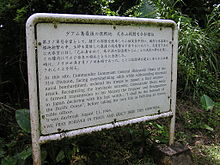Hideyoshi Obata
Hideyoshi Obata | |
|---|---|
 Japanese General Hideyoshi Obata | |
| Native name | 小畑 英良 |
| Born | 2 April 1890 Osaka prefecture, Japan |
| Died | 11 August 1944 (aged 54) Guam |
| Allegiance | |
| Service | |
| Years of service | 1911–1944 |
| Rank | General (posthumous) |
| Commands |
|
| Battles / wars | World War II |
Hideyoshi Obata (小畑 英良, Obata Hideyoshi, 2 April 1890 – 11 August 1944) was a general in the Imperial Japanese Army in World War II. In March, 1944, Obata was assigned to the newly created 31st Army in charge of the inner line of defense of Japan. This included the Marianas, Carolines, and the Volcano-Bonin Islands. The IJA 29th Division, IJA 53rd Division, and 109th Division, with approximately 80,000 men. The 109th was stationed at Chichi-jima[1] and command given to General Tadamichi Kuribayashi.
Biography
Obata was a native of Osaka prefecture. He graduated from the 23rd class of the Imperial Japanese Army Academy in December 1911, and was commissioned as a lieutenant in the cavalry. In 1919, he graduated from the 31st class of the Army War College and was promoted to the rank of captain in the cavalry.
From 1923-1927, Obata was assigned as a military attaché to the United Kingdom and from 1927-1934 as military attaché to British India. In August 1934, he was promoted to colonel in the cavalry and recalled to Japan for staff postings within the Imperial Japanese Army General Staff.
Obata was promoted to major general in March 1938, and was reassigned from cavalry to army aviation. He was appointed Commandant of the Akeno Army Air School in August 1938. In December 1940, he was promoted to lieutenant general and commander of the IJA 5th Air Group in Taiwan at the start of the Pacific War. His command was subsequently assigned to the Burma front in 1942. In May 1943, he became commander in chief of the IJA 3rd Air Army but was recalled to Tokyo in December.[2]
On 18 February 1944, Obata was assigned command of the Thirty-First Army (Japan), with the IJA 29th Division and IJA 53rd Division in charge of the defense of the Mariana Islands from the approaching Allied forces. He was away from his headquarters on Saipan at the time of the American invasion and established his new command post on Guam. However, at the Battle of Guam he was soon overwhelmed by superior American numbers and firepower, and after giving the order that his forces should fight to the death, he committed seppuku on 11 August 1944.[3] Obata was promoted posthumously to the rank of general.

References
- ^ U.S. Marine Corps World War II Order of Battle:Ground and Air Units in the Pacific War, 1939-1945 (Google eBook)- Retrieved 2014-04-17
- ^ Budge, Pacific War Online Encyclopedia
- ^ Chen, World War II Database
Books
- Dupuy, Trevor N. (1992). Encyclopedia of Military Biography. I B Tauris & Co Ltd. ISBN 1-85043-569-3.
- Fuller, Richard (1992). Shokan: Hirohito's Samurai. London: Arms and Armor. ISBN 1-85409-151-4.
- Gailey, Harry (1988). The Liberation of Guam 21 July - 10 August. Novato, California, U.S.A.: Presidio Press. ISBN 0-89141-651-X.
- Hayashi, Saburo; Cox, Alvin D (1959). Kogun: The Japanese Army in the Pacific War. Quantico, VA: The Marine Corps Association.
